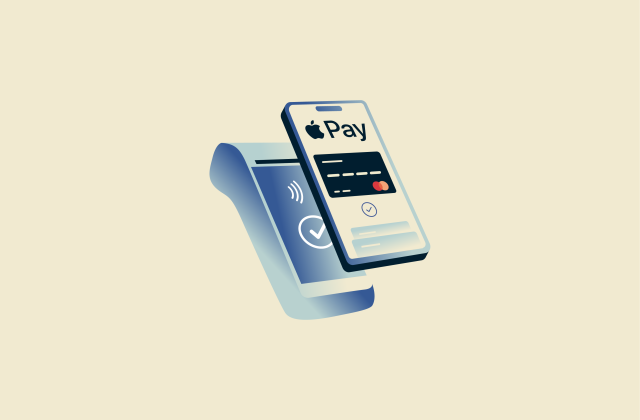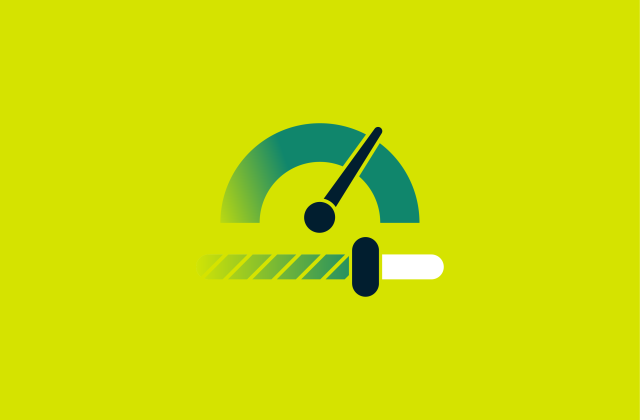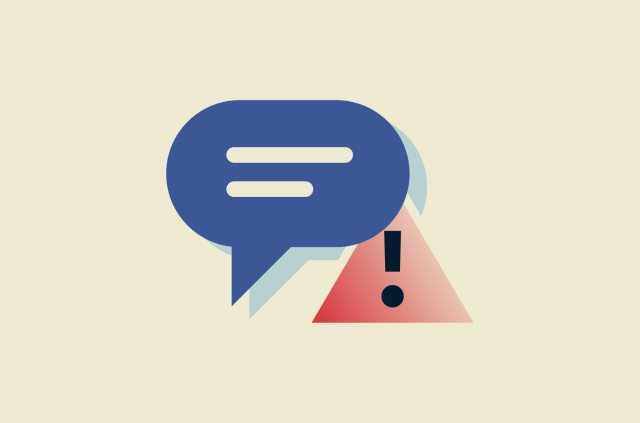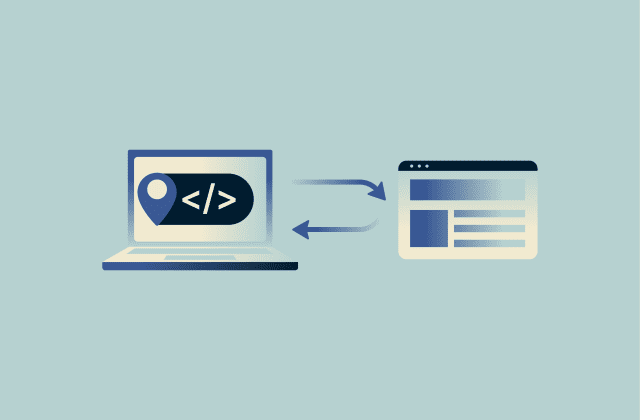Airbnb scams: How to spot them and protect yourself as a guest or host
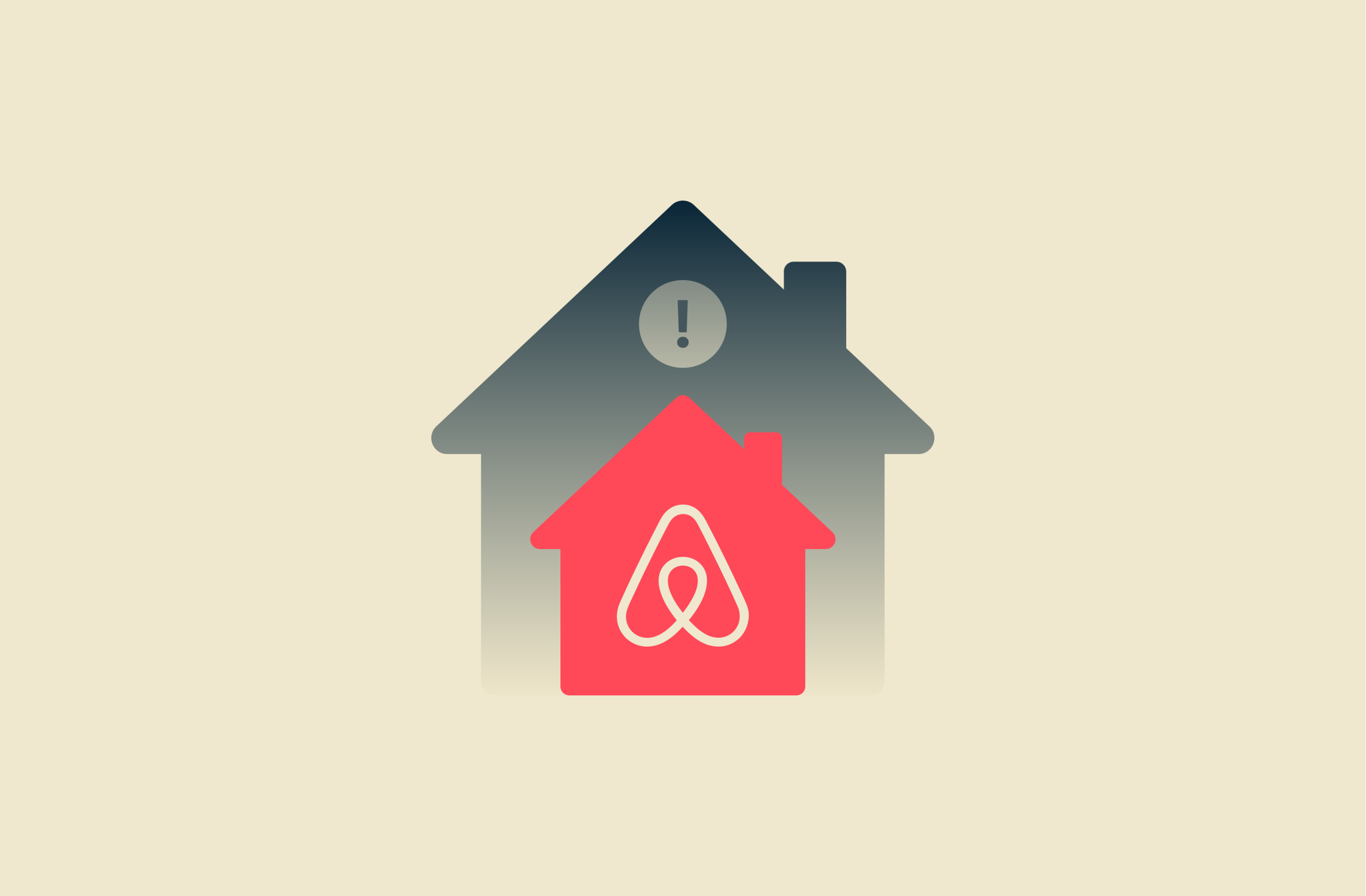
Airbnb has changed how people travel, but its convenience can make it a target for scammers.
Unfortunately, while Airbnb’s security measures do stop many fraudulent attempts, some still slip through. These scams range from fake profiles and phishing messages to nonexistent rentals designed to steal money or personal information.
This guide explains how Airbnb scams work, the red flags to look out for, and practical steps to protect yourself, whether you’re booking a trip or welcoming guests.
Introduction to Airbnb scams
Every day, an average of 1 million people check into Airbnbs. While it’s convenient for securing a last-minute getaway, the sheer volume of visitors and bookings can also make the platform appealing to scammers. In fact, in 2023, Airbnb removed 59,000 fake listings and blocked 157,000 attempts to create fraudulent ones.
Who is at risk: Guests, hosts, or both?
Both guests and hosts face risks on Airbnb, though the scams targeting them differ. Guests are more likely to encounter fake listings, phishing messages, false damage claims after checkout, or requests for payments outside of Airbnb’s platform. Usually, these scams focus on stealing money or personal data.
For hosts, scams tend to relate to fake guest profiles or chargeback fraud. Some scammers also copy a host’s property details to create fake listings elsewhere, ultimately tricking travelers into booking a stay that doesn’t exist.
How Airbnb protects its users
The platform uses many safety measures, including ID verification, secure payments, and tools to flag suspicious behavior. It also has AirCover, which provides booking guarantees for guests and damage protection for hosts, to help prevent fraud and resolve issues swiftly.
Common Airbnb scams used by fraudulent hosts
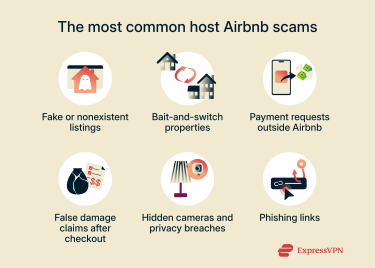
Fake or nonexistent listings
Bad actors might create fake Airbnb listings for properties that don’t exist, aren’t available, or belong to someone else. They sometimes use fake photos to make the listing look genuine, in the hope that it will attract guests with low prices or appealing descriptions.
When you arrive at the property, you might find a completely different building, a run-down apartment, or an occupied home with an owner who has never heard of Airbnb. Sometimes, the address is entirely made up, so there’s no property at all. By the time you realize the listing was fake, the scammer has already collected payment and disappeared.
Airbnb uses photo and identity verification to help detect and remove false listings before anyone books them. Hosts can also choose to verify their location, which helps ensure the property is legitimate. However, this step isn’t required for every property, so fake listings could still end up on the platform.
Bait-and-switch properties
This scam starts when a host tries to draw you in with a great-looking listing at a competitive price. The property seems perfect, and they may urge you to book quickly before someone else does. After you’ve paid and are ready to check in, the host might suddenly claim the original listing is unavailable.
They might blame a double booking or a maintenance issue, then offer you a replacement property that’s smaller or in a worse location. And because you’ve already paid and need somewhere to stay, you might feel pressured to accept.
Agreeing to a last-minute switch like this can make it difficult to report the scam or get a refund later. Scammers sometimes rely on that hesitation, knowing guests need a place to sleep and don’t want to argue while on holiday.
Payment requests outside Airbnb
Sometimes, a host asks you to pay outside of Airbnb’s platform, often promising a discount or special offer if you do. It might sound harmless, but sending money directly removes Airbnb’s protection and can make it difficult to recover your funds if something goes wrong.
Airbnb’s policy is clear on always paying and communicating through the platform. This keeps your booking covered under AirCover, which can help you rebook or get a refund if the listing turns out to be fraudulent.
False damage claims after checkout
In this scam, a host might accuse you of damaging their property or breaking house rules and demand reimbursement. Some claims are genuine, but dishonest hosts can use false or exaggerated accusations to get extra money after a stay.
Some go further, manipulating photos or fabricating evidence to support their story and get your money. One traveler in New York was accused of causing more than $16,000 in damage, only to discover the host had altered images to use as their proof.
Airbnb’s AirCover for guests includes protection for situations like this. If a host tries to accuse you of causing damage, you can respond through Airbnb’s Resolution Center. Airbnb will review the claim and evidence from both sides before deciding whether you’re responsible.
Hidden cameras and privacy breaches
Airbnb’s policy allows outdoor security cameras, such as those on driveways or entryways, as long as they’re disclosed in advance on the property listing. However, it strictly prohibits hosts from installing hidden cameras inside any part of a property’s interior, even if they’re turned off or disconnected.
Most hosts follow these rules, but investigations have uncovered some rare cases where guests found hidden cameras. In one case, a CNN investigation found that police had seized unauthorized images from hidden devices discovered in Airbnbs.
Phishing links
Phishing is an online scam that targets Airbnb users through fake emails or websites designed to look like the real platform. The goal is to trick you into sharing personal information, login details, or payment data that scammers can later use to access your account.
These messages could include links to a site that looks identical to Airbnb, with a similar logo and web address. If you enter your credentials, cybercriminals might be able to get full access to your account and saved payment methods. Sometimes, this can even lead to identity theft or fraudulent bookings made in your name.
Common Airbnb scams used by fraudulent guests
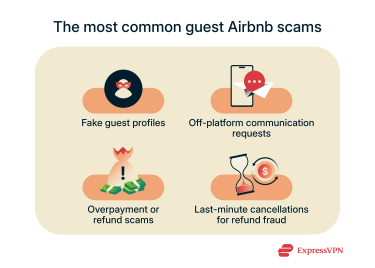
Fake guest profiles
Some scammers pose as guests using fake or stolen identities to book a stay. Once inside the property, they might throw parties, damage your home, or refuse to leave. Others take advantage of fake profiles to carry out theft or illegal activity before disappearing without paying for extra charges. Some may also book a listing for two guests to keep the price low, only to turn up with many more people.
These scams often rely on incomplete or newly created profiles that look legitimate at first but lack real reviews or personal details. In one case, a host in North Carolina faced a months-long legal battle after fake guests refused to leave her home after their stay ended.
To protect hosts, Airbnb requires all users to verify their identity, usually through photo ID, face verification, and confirmed contact details. This helps to ensure that only legitimate guests are able to book through the platform. However, some scammers try to find ways around the system using stolen IDs or creating new accounts with limited information.
Guests requesting off-platform communication
Requests to communicate outside Airbnb (such as via email, text, or WhatsApp) are a common warning sign of a scam. These requests might try to move you away from Airbnb’s secure system so the scammer can make deals, request direct refunds, or otherwise avoid the company’s rules.
Once you communicate outside the platform, Airbnb can’t monitor the exchange or help if something goes wrong. You also lose access to important protections like AirCover for guests and hosts, which covers refunds, rebooking, and damage claims.
Overpayment or refund scams
Overpayment or refund scams happen when a guest books your property and offers to pay you directly through Venmo or PayPal. Soon after, they might claim to have sent too much money by mistake and ask you to refund the difference.
The problem is that the original payment could be from a fake or stolen card. Sometimes, a guest might also cancel a pending payment on a legitimate card. Once the payment is reversed, you lose both the money you refunded and the original booking.
Rarely, scammers also exploit Airbnb’s payment system through chargeback fraud. This happens when a guest disputes a legitimate charge with their bank after their stay, claiming the payment was unauthorized. Airbnb can submit evidence to support you as the host, but if the chargeback is upheld, it may take the disputed amount from your future payouts.
Last-minute cancellations
Some guests use Airbnb’s refund policies to their advantage by cancelling bookings shortly before check-in to snag a cheaper reservation with another host, since discounts are common for late bookings. These situations don’t always involve deliberate fraud, but they still cost hosts money because there’s no time to rebook the dates.
Red flags and scam warning signs
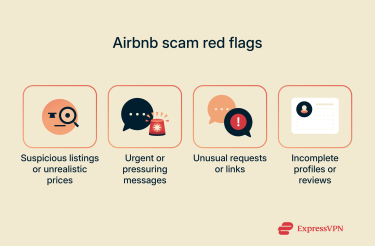 Some listings seem too good to be true, while others come with odd requests or messages that feel off. While most of these red flags help guests identify misleading or fraudulent hosts, a few may also help hosts spot suspicious guest behavior.
Some listings seem too good to be true, while others come with odd requests or messages that feel off. While most of these red flags help guests identify misleading or fraudulent hosts, a few may also help hosts spot suspicious guest behavior.
Suspicious listings and unrealistic pricing
Scammers often rely on eye-catching deals to draw you in. A listing might look perfect, but small details can reveal when something isn’t right. Look out for:
- Prices that are much lower than similar places nearby.
- Photos that look staged, edited, or too perfect.
- Vague descriptions or listings that don’t match the photos.
- Listings with few or no reviews, or reviews that sound copied.
- Listings without a verified location badge.
Urgent or pressuring messages
One tactic scammers use is to try to rush you into making decisions, so you have less time to think before making a booking. Look out for warning signs such as:
- Messages pushing you to book right away.
- Messages mentioning that someone else is competing with a booking.
- Messages asking for quick payments to secure the listing.
- Messages that feel off with vague, overly pushy, or rude language.
Unusual requests or links
Scammers sometimes send emails or texts that look like they’re from Airbnb, but the goal is to get you to click a link and enter your login or payment details on a fake site. Look out for:
- Messages sent from public email domains such as @gmail.com.
- Misspelled domains that look similar to real ones (like airbbn.com or amaz0n.com).
- URLs filled with random symbols or hyphens.
- Spelling or grammar mistakes.
- Unexpected attachments or files.
- Requests for personal information, passwords, or payment details.
- Requests to communicate or send payment outside of the platform.
Incomplete profiles or reviews
Profiles with little or no information can sometimes indicate a scam. Fraudsters may set up fake accounts quickly and skip details. Red flags include:
- Missing profile photo or bio.
- No reviews or booking history.
- Generic or vague details that don’t sound personal.
- Incomplete information that makes it unclear who you’re dealing with.
How to avoid Airbnb scams
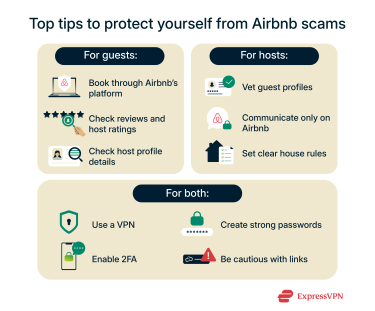
For guests
Booking through Airbnb is usually safe, but scams can happen if you rush or agree to step outside the platform.
Book only through Airbnb’s platform
Always book and pay on Airbnb’s website or app. If a host asks you to pay by bank transfer, Venmo, PayPal, or any other method outside Airbnb, it might be a scam.
Review listing history and host ratings
Before booking, take time to read recent reviews and look for ones with specific details about the property and host. Be cautious of new listings with no reviews or ones with short, repetitive comments that sound copied.
Check the host’s profile information
Choose hosts with profiles that include a photo and contact details. If you’re unsure about a listing, message the host through Airbnb’s platform to confirm information and see how they respond. Legitimate hosts are usually happy to answer questions, but a scammer might try to avoid you.
For hosts
Before accepting a booking, make sure you do a few quick checks.
Vet guest profiles thoroughly
Check a guest’s profile before accepting a booking. Look for a profile photo and reviews from other hosts. Be careful with guests who have very little information.
Pay attention to how they message you, as vague or inconsistent replies can be a warning sign. If you’re unsure, ask follow-up questions through Airbnb Messages to confirm who you’re hosting.
Communicate only on Airbnb
Keep all conversations and transactions within Airbnb’s platform. Messaging or sending and receiving money outside the system removes the protections that AirCover offers for both hosts and guests. Staying on Airbnb also means you have a record of every message and transaction, which helps if you ever need support.
Set clear house rules and expectations
Make sure guests understand your rules before they arrive. Be clear about things like guest limits, smoking, pets, or noise. It helps avoid confusion later. Take photos of your property before and after each stay, and handle any problems through Airbnb’s Resolution Center so everything is tracked in one place.
For both
There are a few extra security measures you can enable to help keep yourself safe as a host or guest.
Enable two-factor authentication (2FA)
Turning on 2FA adds an extra step when signing in, usually a one-time code sent to your phone or email. This means that even if someone steals your password, they can’t access your account without that verification code. Airbnb offers built-in two-step verification, so you can enable it in under a minute in your account settings.
Use strong passwords
A strong password is one of the easiest and most effective ways to help protect your account. Use a mix of letters, numbers, and symbols, and avoid using the same password on other sites. Make sure you choose hard-to-guess words instead of something predictable like a pet’s name or your birthday.
Password managers can also help you create and store complex passwords so you don’t have to remember them all yourself.
Verify every link before clicking
Phishing scams are often sent by email or text, pretending to be from Airbnb. They might use urgent language like “verify your account now” or “confirm your booking” and include links to fake websites.
Before clicking, check the sender’s address carefully and hover over any link to see the full URL. If it doesn’t start with https://www.airbnb.com, don’t click it. Be careful of URLs that look like Airbnb, for example, “airb&b” rather than “airbnb”. Only access Airbnb directly through the official website or app instead.
Use a virtual private network (VPN)
If you’re booking or logging into Airbnb on public Wi-Fi, a VPN adds an important layer of protection. It encrypts your connection so others on the network can’t see what you’re doing, or even that you’re on Airbnb.
ExpressVPN also includes Threat Manager, which blocks you from accessing known malicious websites. This helps reduce the risk of accidentally clicking through to a cloned or fraudulent Airbnb page that’s already identified as unsafe.
Remember, most Airbnb scams rely on social engineering, so while a VPN can keep your connection private, it can’t protect you from everything. If you voluntarily enter details on a phishing site or reply to a convincing fake message, a VPN can’t help you. Always combine a VPN with careful browsing habits, especially when a deal or request seems unusual.
What to do if you get scammed on Airbnb
If you think you’ve been scammed, the most important thing to do is report it to Airbnb. The sooner you report it, the better.
Reporting a scam to Airbnb
Once you’ve spotted suspicious activity, stop communicating with the person immediately and start collecting evidence. Take screenshots of your Airbnb messages, the listing, any emails, and off-platform conversations.
Report a message
- Click on the three lines next to your profile picture and select Messages.
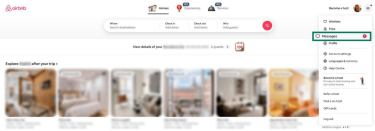
- Select the three dots (...) at the bottom of the chat you want to report.
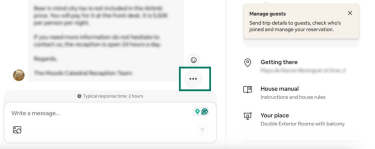
- Choose Report this message.
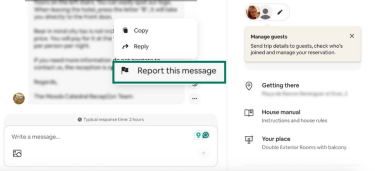
- You’ll be asked whether your issue is related to this trip. Select It’s about something else.
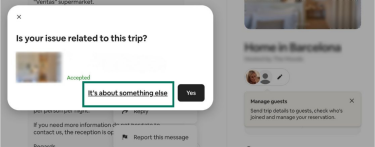
- Choose I think they’re scamming or spamming me, and add any extra details.
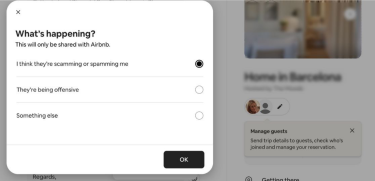
- Select OK to send your report.
You can also block the sender to prevent them from contacting you again.
Report a listing
- Open the listing page.
- Scroll down to the pricing or availability section.
- Select Report this listing.
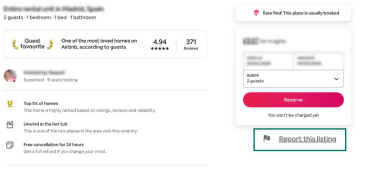
- Choose a reason based on what seems suspicious. You may be asked to provide some further information depending on which option you choose.
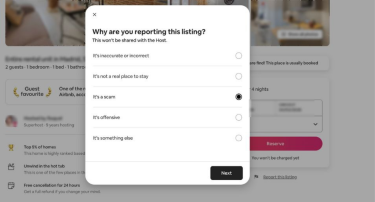
- Select Next to send your report.
Disputing charges and seeking refunds
If you believe you’re owed a refund or want to dispute charges, you can contact Airbnb’s Resolution Center. You have up to 60 days after checkout to submit a request.
If an issue disrupts your stay, such as if the property isn’t as described or seems unsafe, you should report it within 72 hours. In these cases, Airbnb might offer a partial or full refund or help you find another place.
If you’ve already filed a chargeback with your bank, the refund process goes through your card provider instead. Note that Airbnb doesn’t issue the refund in this situation, and it might take some time for your bank to review it.
To request a refund through Airbnb:
- Head to the Airbnb Resolution Center and click Request money.

- Select your reservation and click Choose.

- Choose the reason for your refund and upload any evidence.

- Click Next, then Request.
Contacting Airbnb support and escalation options
If you’ve already opened a case and need to escalate it, reply to the existing message thread in your Airbnb inbox or follow up in the Resolution Center. This keeps your evidence and communication in one place so the next support agent can review the full history.
FAQ: Common questions about Airbnb scams
Is Airbnb safe from scams?
Airbnb is generally safe to use, and most stays happen without problems. The company uses ID verification, secure payments, and support to reduce fraud. But no platform is completely threat-proof, and unfortunately, Airbnb isn’t immune to scams. It’s still important to stay alert for fake listings, off-platform payment requests, or suspicious messages.
How can I tell if an Airbnb listing is fake?
Fake listings often have unrealistic prices, vague descriptions, or images that look overly polished. Missing reviews or requests to pay outside Airbnb are also warning signs. If something feels off, search the photos online or check the address in Google Maps before booking.
What are the signs of a scam guest on Airbnb?
Signs of scam guests include incomplete or fake profiles, avoidance of answering questions, or pushing to communicate off-platform. Some may try to pay outside Airbnb or create urgency to get you to accept a booking quickly. Always check reviews and profile details before confirming a stay.
Will Airbnb refund me if I get scammed?
Airbnb may refund you under its rebooking and refund policy if you report the issue within 72 hours for listing-related problems. The company reviews each case individually and can also help you find a replacement stay if needed.
Can Airbnb hosts be victims of scams, too?
Yes. Hosts are at risk of overpayment scams or guests using fake profiles to book their property. To protect yourself from scams, always review guest profiles, use Airbnb’s messaging system, and document your property before and after each stay.
What steps can I take to protect myself on Airbnb?
To protect yourself from scams, always stay on Airbnb’s platform for all payments and messages, and never share personal or financial details through email or text. Read reviews carefully, check profile details, and enable two-factor authentication (2FA) on your account. If something feels suspicious, report it directly through Airbnb before taking further action.
Take the first step to protect yourself online. Try ExpressVPN risk-free.
Get ExpressVPN





